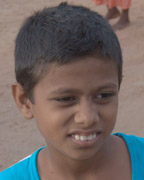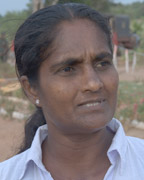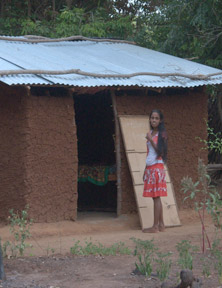|
Konwewa is a newly resettled village:
Welioya villagers return to their lands
By Dhaneshi Yatawara after a tour of Welioya
The journey becomes more wearisome when the sights are so new, the
heat fierce and there is dust everywhere. The vehicle groaned moving
over the improbable road to a village in Welioya. We were on our way to
Konwewa, a remote villages in Welioya in the Mullaitivu district where
families have returned during the past few months to resettle in their
homeland.
 |
| New businesses
coming up in the resettlements |
 |
 |
| Somarathne |
 |
| Sasindu |
 |
| Padma
Gunasekara |
Amid the setting sun one could easily feel the dull loneliness that
will follow the dusk, while making the night scary to a stranger.
That evening, the entire village was gathered at the village temple
for a special function. Resettling in their much abandoned homes and
making a normal return to life would be what haunts the elders. Yet, to
the children it is a fun- filled afternoon. Ten-year-old, Sasindu
Malith, stood out among the crowd. He wanted to talk and tell his story
of the new life he began with his family in the land owned by his
grandparents. Sasindu Malith and many children of the Konwewa village
attend the main school in Ethawetunu wewa leaving from home in the 6.15
am bus. He returns home in the bus leaving Ethawetunu wewa around 2.30
p.m. What do the children do when they miss the bus from the town? "Oh,
we all just walk from the main road. We take the bus up to the nearest
junction and we walk home together. Its fun," said little Sasindu.
The walk they have to take for more than three kilometres to home is
fun time for the children, yet worries their parents.
Konwewa is a newly resettled village in the General Area Welioya
where there were mostly Sinhala settlements. According to K.G.
Somarathne the official from the Village Welfare Society, they have
started resettling nearly five months ago. "It was my grandparents who
settled here first, nearly 80 years ago and where my parents were born
and we were born. Because of terrorist threats continuously for years we
had to leave.
Our education was disrupted and many youngsters those days went
looking for jobs even at the age of 15 or 16. That was the only choice
we had to move away from terrorism," said Somarathne.
S.M. Padma Gunasekara came from Padaviya to settle down in Konwewa
after getting married in 1985. "We built a nice house and we were self
sufficient with our paddy and vegetable harvest," she said in
reminiscence of the life those days until 1999. "It was in 1999, that
the LTTE attacks began to aggravate. We remained in the villages because
of the security provided by the Sri Lanka Army as they set up security
points in the vicinity," she said.
It had been a bloody terror-filled era, according to Padma. "Our
husbands and all the adult males of every house occupied a weapon to
face any terrorist threat. It was that intense those days," she said.
"LTTE have killed villagers, people known to us, our neighbours in a row
with 60 - 70 people.
 |
|
Still living in temporary
shelters |
Young children were tortured and hacked to death. A son of one of my
neighbours was tortured before being killed by a large pole being forced
into his anus. Everyday we saw bodies of young people of the village,"
she said.
Today she and many others have returned to the land soaked with the
blood of their own children, people. In spite of how gloomy and violent
the past was, they still love their native land and want their children
to grow in that serene place.
Today, Padma lives with his husband and children in a temporary house
built on a half an acre land. Her husband has joined the Civil Defence
Force, yet today he is crippled due to an accident that happened while
he was in duty.
The irrigation tanks and canals are still under repair and until the
work completes these people have to cultivate hoping for rain water.
Paddy, Kurakkan, Chillies and several dry zone vegetables are their main
crops.
The average price they get for a kilo of paddy ranges between Rs. 22
- 25 and mainly private traders come. "We are struggling to protect our
crops from the elephants," Padma said. "Whatever the difficulty, we will
not leave our lands. We did not leave for years even with the LTTE
threats. And surely we are not going to leave again. This is our home
and this is where we are comfortable to live in," she said.
|


